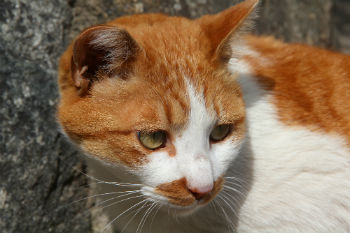Did You Know that Cats Can Get the Flu Too?
Influenza (Flu) is not just about people. Your cat may also get this viral infection. Although most cats recover completely from influenza(Cat Flu), it can be particularly difficult in young, older or immune-deficient cats.
Causes of Cat Flu
The symptoms of influenza are often caused by exposure to “Feline Calicivirus” (FCV) or feline viral rhinotracheitis virus (FVR). Viruses spread when an infected cat coughs or sneezes and your cat inhales infected air droplets or when your cat comes in contact with a bowl of water, a blanket, a toy, a sandbox, or other objects that contain the infected cat’s saliva. Cats become lifelong carriers once they get infected with other cat flu. You can be an unintended source of cat flu. Because the virus can survive for hours on surfaces, as long as it stays wet, you can take it home with your clothes or shoes, without knowing it.
Some Common Symptoms of Cat Flu
Your cat might experience many of the same symptoms that you have when you have the flu. Some of the most common signs and symptoms include:
- Dehydration
- Runny nose
- Cough
- Sneeze
- Joint pain
- Red or pink eyelids
- Eye discharge
- Scratchy voice when meowing
- Ulcers in the mouth or in and around the eyes
- Fever
- Loss of appetite
- Fatigue
- Mostly cases of feline influenza last from 10 days to three weeks. Your cat may feel sick about two to five days after exposure to a virus.
Contact the Veterinarian
Veterinary care is important if your cat is very young or old, has a disease that has compromised the immune system, or a disease or chronic condition, such as kidney failure or diabetes. These animals are more likely to develop pneumonia or other secondary infections and should be carefully monitored and promptly treated for complications.
If your pet develops any of the symptoms of cat flu then consulting your veterinarian is a good idea. Often it is possible to make a diagnosis based on these symptoms and the veterinarian might want to confirm your pet’s diagnosis with blood and urine tests and X-rays in some cases. If you suspect that your cat is suffering from cat flu, tell your veterinarian when you make an appointment.
Antibiotics are not helpful in treating viruses, however, your vet can offer treatments for your cat to prevent complications and make your cat more comfortable. For example, sore mouth ulcers can force your pet to stop drinking water, which can lead to dehydration. During your visit, your cat may receive intravenous fluids to restore the normal balance of fluids and electrolytes.
Preventing Cat Flu with Vaccines
Vaccines for feline herpes virus (FHV-1) and feline calicivirus (FCV) are always combined, as these two viruses together are the main causes of upper respiratory tract infections in cats (cat flu).
How to Make Your Cat More Comfortable?
It is not surprising that cats with cat flu are often miserable. You can make your cat more comfortable by trying some of these tips:
Use a cool mist spray to facilitate breathing. (Be sure to keep it out of the reach of your cat).
Clean the discharge of eyes and mouth with a damp cloth.
Provide a variety of foods to encourage your pet to eat.
Move the cat little closer to your cat’s favorite resting place.
Install a warm bed in a quiet part of the house away from drafts.
The vaccination of your cat can provide protection from the flu. Although the vaccine is effective against the most common flu strains, your cat may still be ill if she is infected with a less common or new strain of influenza.
Separating a sick cat from a healthy cat is important if you have multiple cats. Often wash sheets and blankets and regularly clean hard surfaces to protect your other cats from getting sick.
Are you worried that your cat is suffering from cat flu or other illness? Immediate veterinary treatment can help your pet recover and avoid serious complications. Contact us today for a practical appointment.











